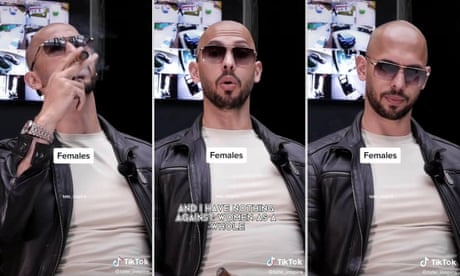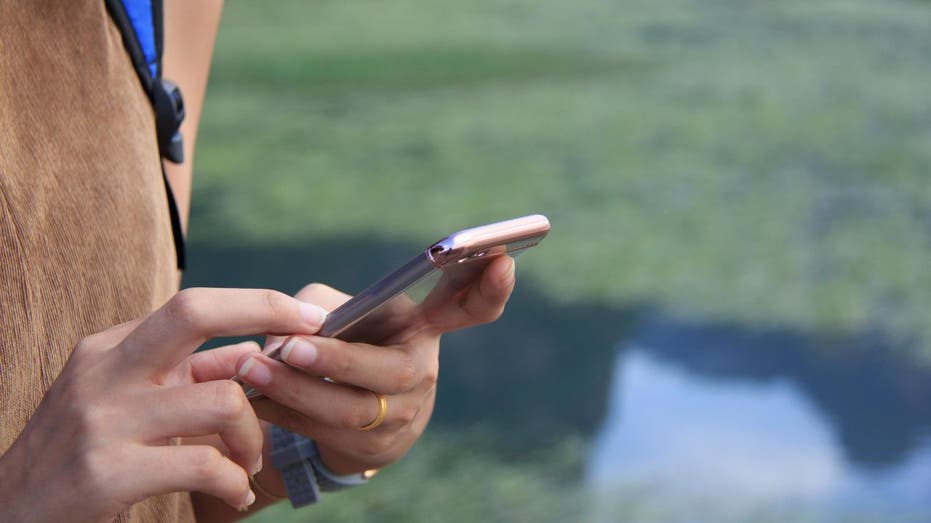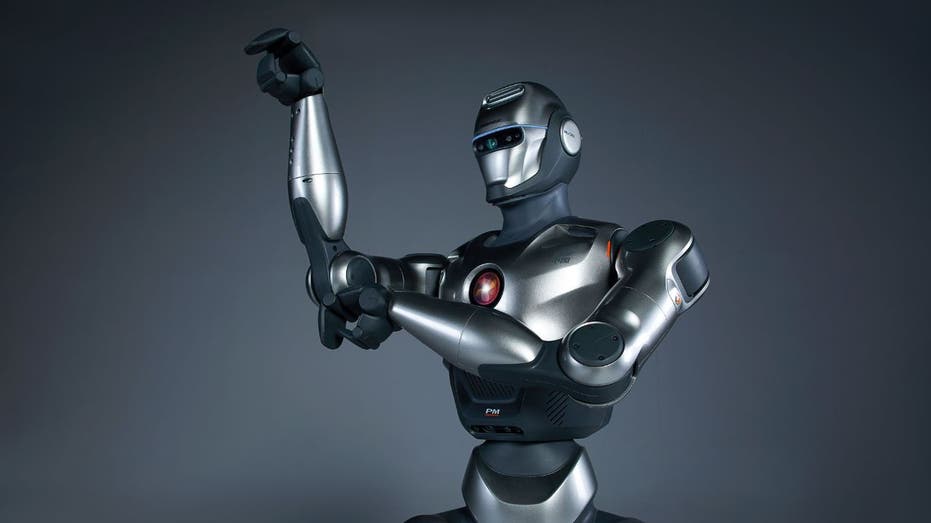- by foxnews
- 10 Mar 2025
Inside the violent, misogynistic world of TikTok’s new star, Andrew Tate
Inside the violent, misogynistic world of TikTok’s new star, Andrew Tate
- by theguardian
- 08 Aug 2022
- in technology

Andrew Tate says women belong in the home, can't drive, and are a man's property.
He also thinks rape victims must "bear responsibility" for their attacks and dates women aged 18-19 because he can "make an imprint" on them, according to videos posted online.
In other clips, the British-American kickboxer - who poses with fast cars, guns and portrays himself as a cigar-smoking playboy - talks about hitting and choking women, trashing their belongings and stopping them from going out.
"It's bang out the machete, boom in her face and grip her by the neck. Shut up bitch," he says in one video, acting out how he'd attack a woman if she accused him of cheating. In another, he describes throwing a woman's things out of the window. In a third, he calls an ex-girlfriend who accused him of hitting her - an allegation he denies - a "dumb hoe".
Tate's views have been described as extreme misogyny by domestic abuse charities, capable of radicalising men and boys to commit harm offline.
But the 35-year-old is not a fringe personality lurking in an obscure corner of the dark web. Instead, he is one of the most famous figures on TikTok, where videos of him have been watched 11.6 billion times.
Styled as a self-help guru, offering his mostly male fans a recipe for making money, pulling girls and "escaping the matrix", Tate has gone in a matter of months from near obscurity to one of the most talked about people in the world. In July, there were more Google searches for his name than for Donald Trump or Kim Kardashian.
His rapid surge to fame was not by chance. Evidence obtained by the Observer shows that followers of Tate are being told to flood social media with videos of him, choosing the most controversial clips in order to achieve maximum views and engagement.
The coordinated effort, involving thousands of members of Tate's private online academy Hustler's University and a network of copycat accounts on TikTok, has been described by experts as a "blatant attempt to manipulate the algorithm" and artificially boost his content. In less than three months, the strategy has earned him a huge following online and potentially made him millions of pounds, with 127,000 members now paying the �39 a month to join Hustler's University community, many of them men and boys from the UK and US.
Yet despite much of the content appearing to break TikTok's rules, which explicitly ban misogyny and copycat accounts, the platform appears to have done little to limit Tate's spread or ban the accounts responsible. Instead, it has propelled him into the mainstream - allowing clips of him to proliferate, and actively promoting them to young users.
Raised on an estate in Luton, the son of a catering assistant and chess master, Tate has long been making headlines for stirring controversy. Through his 20s he worked as a TV producer while training as a kickboxer at the local gym, going on to fight professionally and win world titles.
In 2016, his public-facing career appeared to be over when it had barely begun, when after being cast in Big Brother he was ejected from the house over a video of him hitting a woman with a belt. A second video emerged shortly afterwards, in which he is shown telling a woman to count the bruises he apparently caused to her. Both Tate and the women denied any abuse occurred, and said the clips showed consensual sex.
More controversy followed. Posts containing homophobic and racial slurs were found on his Twitter page. Then in September 2017, he was criticised by mental health charities for saying depression "isn't real". The next month he waded in on #MeToo, saying women should "bear some responsibility" for being raped - a view he has since repeated and which, among other incidents, led to him being barred from Twitter.
The backlash won Tate work and boosted his profile. He appeared on InfoWars, the podcast of conspiracy theorist Alex Jones; was pictured with far-right YouTuber Paul Joseph Watson and met Donald Trump Jr at Trump Tower, posting on Facebook afterwards: "The tate family support trump FULLY. MAGA!"
In the UK, meanwhile, he mingled with arch-Brexiter Nigel Farage, Facebook photos show and spoke of ties with the anti-Islam activist Stephen Yaxley-Lennon, known as Tommy Robinson. Tate describes Yaxley-Lennon in a podcast as a "solid guy" with a "good heart" whom he has "hung out with untold times". In 2019, police were called after Tate showed up at the house of Mike Stuchbery, a journalist who had been critical about him online, days after Yaxley-Lennon did the same thing. The incident caused Stuchbery's wife to suffer a panic attack and played a role in them leaving the UK for Germany.
Long before his rise to TikTok fame, Tate's views on women were also becoming clear. On Facebook in 2018, he bemoaned the "decline of Western civilisation" after seeing a poster at Heathrow airport "encouraging girls to go on holiday as opposed to encouraging being a loving mother and a loyal wife".
He also openly discussed being accused of violence against several women, although he is not understood to have ultimately been charged with any offences apart from a driving offence in 2018. In one interview, Tate describes an incident where a woman knocked a phone out of his hand in a club, and a man punched him, so they started wrestling. In the tussle he accidentally hit the woman and broke her jaw, he says.
In another video, he says he has been investigated by police for allegedly abusing a woman, which he denied, in a case where he had his house raided, devices confiscated and was held in a cell for two days.
Around the time UK police were investigating abuse allegations, Tate is understood to have left the UK for Romania. In one video explaining his reasons for the move he suggested it was because it would be easier to evade rape charges. This is "probably 40% of the reason" he moved there, he says in one video, adding: "I'm not a rapist, but I like the idea of just being able to do what I want. I like being free."
Yet more allegations would follow. In January, the Daily Mirror reported that Tate and his brother Tristan were "raking in millions from webcam sites where men hand over a fortune as they fall for models' fake sob stories" - something they themselves described as a "total scam".
Then in April, the brothers' mansion was raided by police following a tip-off from the US embassy that a 21-year-old American woman was being held against her will. The Tates were taken in for questioning before being released and deny wrongdoing. The Romanian authorities said last week that the investigation, later expanded to cover human trafficking and rape allegations, was ongoing.
Amid the drama offline, online Tate's content took off. Since January, repackaged videos from interviews with Tate over the years have been attracting millions of views on TikTok. But in recent weeks, this growth has accelerated. In August so far alone, clips tagged with his name have been watched more than a billion times.
The posts do not come from Tate himself, who does not appear to be active on the platform, but from hundreds of accounts, often using his name and photo, run by his followers - members of Hustler's University. Members, including boys as young as 13, are told they can earn up to �10,000 a month through lessons on crypto investing, drop shipping and by recruiting others to Hustler's University, earning 48% commission for each person they refer.
To have the best chance of getting people to sign up, they are advised to stoke controversy to improve their chances of going viral.
In one guide, Hustler's University "students" are told that attracting "comments and controversy" is the key to success: "What you ideally want is a mix of 60-70% fans and 40-30% haters. You want arguments, you want war."
Many Tate videos appear, at first glance, to be harmless, even funny. In his trademark straight-talking style, he derides men who drink tap water instead of sparkling water and people who own cats. "Real men have dogs," he says. Other material is presented under a banner of male self-improvement.
But much of it appears to meet the definition of hateful content set out in TikTok's community guidelines, which state that TikTok is "inclusive and supportive" and bans content that "praises, promotes, glorifies, or supports any hateful ideology", including misogyny.
TikTok's terms also explicitly say they ban accounts that "impersonate" someone else, by using their name or picture in a "misleading manner".
Last week, however, content being promoted to users on the platform appeared to be in flagrant breach of the rules.
We conducted an anonymous experiment with a blank account set up for a teenage boy and were quickly shown content of Tate. After watching two of his videos we were recommended more, including clips of him expressing misogynistic views. The next time the account was opened, the first four posts were of Tate, from four different accounts.
In one video, posted from an account with Tate's name and face, he describes matter of factly how he expects his girlfriends to behave: "I inflict, I expect, absolute loyalty from my woman," he says. "I ain't having my chicks talking to other dudes, liking other dudes. My chicks don't go to the club without me, they are at home."
For Tate's fans, the findings will come as little surprise. Much of his history is not hidden but has been openly discussed in podcasts, and supporters say his straight-talking style is an antidote to so-called cancel culture.
Critics say his rise raises concerns about online misogyny and potential radicalisation, with one woman online labelling him "the scariest man on the internet". Another, seeking advice in a forum, described how her boyfriend's "attitude and opinions" had changed "dramatically" after watching videos of Tate.
Andrea Simon, director of the End Violence Against Women coalition, said many of the Tate videos appeared to "clearly violate" TikTok's terms and said that "by taking no action", the platform is "facilitating and ultimately profiting from the potential radicalisation of its young male users".
The NSPCC's Hannah Ruschen, a policy officer, added: "Viewing such material at a young age can shape a child's experiences and attitudes, resulting in further harm to women and girls in and out of school and online."
Tate's rise also shows how TikTok's algorithm is open to manipulation by bad actors, says Callum Hood, head of research at the Center for Countering Digital Hate "The dangerous thing is that it is very eye-catching content, and the TikTok algorithm in particular is so aggressive that you only need to pause for a few moments before it will begin to recommend similar content to you again and again."
He added: "It's up to TikTok to be on the lookout for harmful content and manipulation of its platform. It begs the question: 'Why haven't they noticed this? And why have they failed to act?"
In a comment this weekend, TikTok said it took misogyny seriously and was actively investigating whether accounts posting content of Tate were breaching its rules.
A spokesperson said: "Misogyny and other hateful ideologies and behaviours are not tolerated on TikTok, and we are working to review this content and take action against violations of our guidelines. We continually look to strengthen our policies and enforcement strategies, including adding more safeguards to our recommendation system."
It did not comment on the claims of platform manipulation, but said users can click "not interested" on videos they dislike to hide future material from that particular account.
Tate, whose content remained widespread on the platform this weekend, did not respond to requests for comment.
- by foxnews
- descember 09, 2016
Ancient structure used for cult 'rituals' discovered by archaeologists
A Neolithic Timber Circle was discovered by archeologists in Denmark resembling the historical landmark Stonehenge in the U.K. It is open to be viewed by the public.
read more





